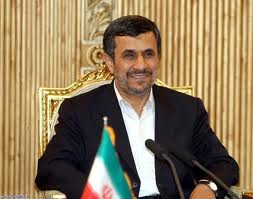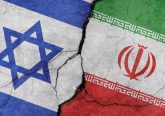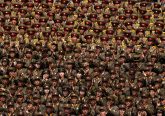چنان قحط سالي شد اندر دمشق كه ياران فراموش كرد عشق
سعدي
“Such famine was there once in Damascus that lovers forgot their love.” Saadi

During a meeting with the Turkish Foreign Minister Ahmet Davutoglu, Secretary of State Hilary Clinton envisioned a Syrian strategy based on two interlinked assumptions: speeding up the end of the bloodshed and the end of the Assad regime. Yet, the these two goals are not forcibly one the consequence of the other, and a fall of the Assad regime might provoke even more atrocities in Syria and beyond, especially if it had to come by military means.
De facto, for the US Secretary of State these two priorities have hitherto been ‘essentialised’ into the need to get rid of Assad as part of the broader strategy to curtail Iran’s role in the Middle East.
Nothing new on the Western front of course, and neither on the Syrian side, where countless human rights violations leave little room for denial.
Meanwhile, the US foreign policy machine formulates a comprehensive package of sanctions which puts together all the elements of the equation, i.e. Iran-Syria-Hezbollah, projecting the conflict onto an explicitly regional dimension, where references to cross-border forces, as said, Hezbollah, Pasdaran and PKK in Syria and Iraq (in anti-Turkey dimension), or CIA, Mossad (in pro-rebel fashion) are part of the public strategic schema of the conflict. It might appear a minor development for a conflict described by most commentators as having a regional dimension since its inception 17 months ago; nevertheless, public stances by US policy-makers and their allies are harbingers of oncoming shifts in their engagement in the conflict.
This shift, emphasised also by sensitive words such as no-fly zone and security perimeter, comes at the time when Iran and other countries seek alternative horizons of political solution to the Syrian crisis, before it reaches the stage of the uncontrollable.
After the spectacular attacks in Damascus at the National Security building, the Syrian Army has been effectively able to drive the confrontation out of the capital, reinstating its capacity to hold on to key areas of the country. But the opposition forces have secured wide international support, both in political and financial terms. In this scenario, Iran has simultaneously been a marginal and a key player. On the one hand Iran has supported the Assad regime for many years by providing development funds (hospitals, infrastructures, etc.), technical support (communication and information technologies) and political backing (diplomatic alliance). On the other hand, Tehran has been excluded from main international gatherings on the Syrian crisis, mainly due to US-Israel opposition.
Thus, Iran staged a diplomatic onslaught on various fronts, in a bid both to gain momentum after Kofi Anan’s vacuum and to provide a diplomatic counterbalance to the ‘Friends of Syria’ camp. This began with the International Consultative Conference in Tehran which was meant to lay the groundwork for an alternative political track. This will continue in the next weeks with the Non-Aligned Movement Summit in Tehran (26-31 August), with the possible participation, after long years of mutual distrust, of Egypt, represented by president Mohamed Mursi.
Hyperactive and multi-lateral engagement have been distinctive features of the Iranian foreign policy, particularly under Ahmadinejad, and, apart from the pro forma considerations on who holds the reign of power in Tehran, one can confidently say that there is a wide consensus (beyond the Majles) on what should be Iran’s priorities, e.g. support for a sympathetic government in Damascus. This priority is more important when the country is increasingly put under international sanctions and isolated from regional and international counterparts.
Although it is true that Tehran’s support to the Assad regime is strategic and part of a long term alliance, the proposals of the Iranian-sponsored conference suggested a set of pragmatic and political steps to exit the civil war scenario in Syria. This may represent a good alternative to the stalemate. It also explicitly recognised the legitimacy of the Syrian opposition groups in broad terms, first having invited them to the conference and then by including them in the plan for future negotiations with the government in Damascus. These are no minor steps for the Iranian government, which despite being ideological in its public language, tends to be cooperative at a regional level, particularly in periods of crises (e.g. Afghanistan 2001; Kuwait 1990-91). If Iranian media emphasise words such as ‘terrorists’, ‘mercenaries’ and ‘extremists’, it does not mean that the government in Tehran considers all the opposition groups as illegitimate. Instead it suggests two points: first, policy-makers are increasingly concerned about the mushrooming of al-Qaeda-like groups across Syria, which implicates a scenario of long-term internal and cross-border instability; second, it is an attempt to deligitimise Western strategy in Syria by focusing on the openly violent, sectarian and fanatic elements.
However, what is more interesting is Iran’s declared readiness to let a transition take place in Damascus, by means of general elections, for which international supervision would be allowed. This hypothesis, remote when one looks at the military confrontation of these days, remains nevertheless among the few options to avoid the continuation of the conflict and further deterioration of Syria’s social compound. In brief, it requires all parts to acknowledge that ideal outcomes cannot be achieved in such a critical and complex context, and that alternative to militarization and bipolarization can create a fragile, yet opportune, environment of dialogue, also in view of the evident proxy nature of the conflict.
The old refrain of ‘war until democracy’ or ‘war until the end of dictatorships’ should now be replaced by a revolutionary strategy of engagement by the indigenous forces in Syria, and less by hopeful Syrian politicians in Istanbul and Paris, who whether for their life experience vis à vis a cruel regime or the love for their dreams to become true, ignore that the practice of power means compromise, when victory is nothing but turning a bloody page into an unknown nightmare.
In proxy wars, the winner is not among the contending parts.
Maziyar Ghiabi is an MPhil student at St Antony’s College, Oxford.








No Comment